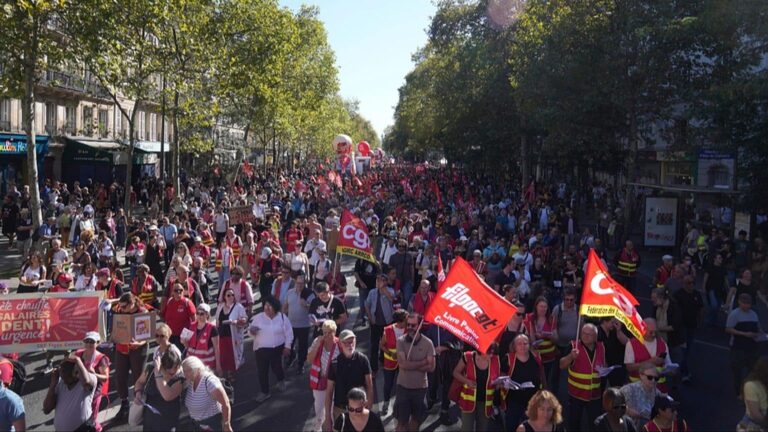France Braces for Major Protests Amid Austerity Budget Controversy
As France prepares to witness what is anticipated to be the largest wave of protests since the contentious pension reform battle, unions are mobilizing against the government’s proposed austerity measures. Demonstrators are set to take to the streets, fueled by growing frustrations over rising living costs and the impact of fiscal constraints on public services. This resurgence of public dissent highlights the ongoing struggle between the government and labor organizations, as citizens voice their concerns over economic policies that they argue disproportionately affect the working class. With tensions mounting, the impact of these protests could reverberate through the political landscape, challenging the government’s position and setting the stage for future confrontations.
France Prepares for Unprecedented Protests Amidst Austerity Measures
As the French government stands firm on its austerity measures, unions have mobilized to counteract what they perceive as an encroachment on citizens’ rights and welfare. Workers across various sectors plan to converge on major cities, most notably Paris, for what is anticipated to be the most significant protests since the contentious pension reforms of recent years. The proposed budget cuts will impact essential services such as healthcare, education, and public transport, prompting widespread discontent among citizens. Union leaders are calling for solidarity, emphasizing the need for collective action to challenge these fiscal policies that disproportionately affect the most vulnerable groups.
In a bid to rally support and demonstrate the scale of opposition, unions are organizing a series of events leading up to the main protest day. Activities will include:
- Public rallies in town squares to raise awareness and gather momentum.
- Workplace meetings to inform employees about the implications of the austerity budget.
- Joint efforts with community organizations to highlight the social impact of these measures.
| Sector | Impact of Austerity Measures |
|---|---|
| Healthcare | Reduced funding for hospitals and clinics |
| Education | Increased class sizes and lower teacher salaries |
| Transport | Fewer public transport services and higher fares |
Union Strategies: Mobilizing Against the Government’s Budget Cuts
As discontent brews over the government’s austerity measures, union leaders are employing a range of strategies to galvanize public support and mobilize action. Central to their efforts is a call for solidarity among workers across various sectors, emphasizing that budget cuts are not just a challenge for public employees but a threat to social welfare for all citizens. The unions are orchestrating mass rallies and strikes to showcase their collective strength. Key tactics include:
- Grassroots Mobilization: Engaging local communities through door-to-door campaigns and social media outreach.
- Strategic Alliances: Collaborating with student organizations and civil rights groups to broaden the base of opposition.
- Public Awareness Campaigns: Disseminating materials that highlight the potential repercussions of budget cuts on vital services.
In addition to immediate actions, unions are focusing on long-term strategies to sustain momentum against these austerity measures. They plan to utilize media outreach and digital platforms to keep the conversation alive, ensuring that the impact of austerity remains at the forefront of public discourse. To provide a more comprehensive overview of their initiatives, unions have also developed a detailed agenda outlining their objectives. This includes:
| Union Initiative | Description |
|---|---|
| Weekly Rallies | Community gatherings to unite stakeholders against budget cuts. |
| Online Petitions | Encouraging public signatures to demonstrate widespread discontent. |
| Workplace Meetings | Engagement sessions within companies to discuss the impact of cuts. |
Public Sentiment and Economic Impact: Understanding the Root Causes
The momentum building across France reflects a deep-seated discontent among the populace regarding the government’s austerity measures. As the unions rally to voice their opposition, the underlying economic pressures are impossible to ignore. Many citizens feel that the proposed budget will exacerbate existing inequalities, negatively impacting essential public services. The sentiment is palpable as frustrations boil over into planned protests, signaling a critical juncture in France’s socio-economic landscape. The implications of this unrest may have far-reaching consequences, as the populace seeks to reclaim their voice from what they perceive as an imposition of draconian policies.
To understand the root causes fueling this uprising, it’s vital to consider the economic factors at play. Public opinion polls reveal a stark divide in attitudes toward government policy, with many prioritizing social welfare over austerity. Key factors contributing to this sentiment include:
- Rising cost of living: Increasing prices of everyday goods are straining household budgets.
- Unemployment rates: Persistent joblessness among youth and vulnerable populations fosters hopelessness.
- Social services cuts: Diminishing funds for healthcare and education are viewed as direct threats to quality of life.
As the situation evolves, the government is faced with a choice: respond to the increasingly vocal public or risk further alienation and unrest. The stakes are high, and how the administration navigates this turbulent landscape will likely define the future trajectory of French society.
Recommendations for Policymakers: Navigating the Path to Compromise
As France prepares for significant protests in response to austerity measures, it is imperative for policymakers to take a balanced approach that fosters dialogue and collaboration among stakeholders. Engaging in open discussions with union representatives and community leaders will not only help address grievances but can also facilitate the identification of mutually beneficial solutions. Key strategies could include:
- Establishing a dialogue forum that includes all affected parties to discuss budgetary constraints and their implications.
- Creating temporary relief measures to alleviate immediate pressures on vulnerable groups while longer-term solutions are debated.
- Implementing transparent communication strategies to keep the public informed about policy changes and their potential impacts.
Moreover, it is crucial that policymakers remain flexible and adaptive in their negotiations. The complexities surrounding budgetary decisions require an approach that prioritizes compromise over confrontation. A potential framework for effective policymaking could include:
| Strategy | Objective |
|---|---|
| Incremental reforms | Gradual implementation to ease public concern. |
| Stakeholder workshops | Gather input and co-create solutions. |
| Evaluation mechanisms | Regular assessment of measures and their effectiveness. |
By prioritizing these approaches, policymakers can not only navigate the immediate challenges posed by the current austerity budget but also lay the groundwork for a more stable and cooperative future. Engaging with diverse voices will be essential to crafting policies that are not only effective but also equitable.
Concluding Remarks
As France prepares for what could be the largest wave of protests seen since the recent pension reforms, the nation’s unions are mobilizing to oppose the government’s austerity measures. With concerns over economic inequality and social justice at the forefront, demonstrators plan to express their discontent across urban centers. The outcome of these protests could significantly impact the government’s fiscal policies and the broader socio-political landscape in France. As tensions rise, all eyes will be on the streets, watching how the state’s response will shape public sentiment and future labor relations. As the situation unfolds, France stands at a crossroads, with the potential for a profound shift in how economic challenges are met in the coming years.




